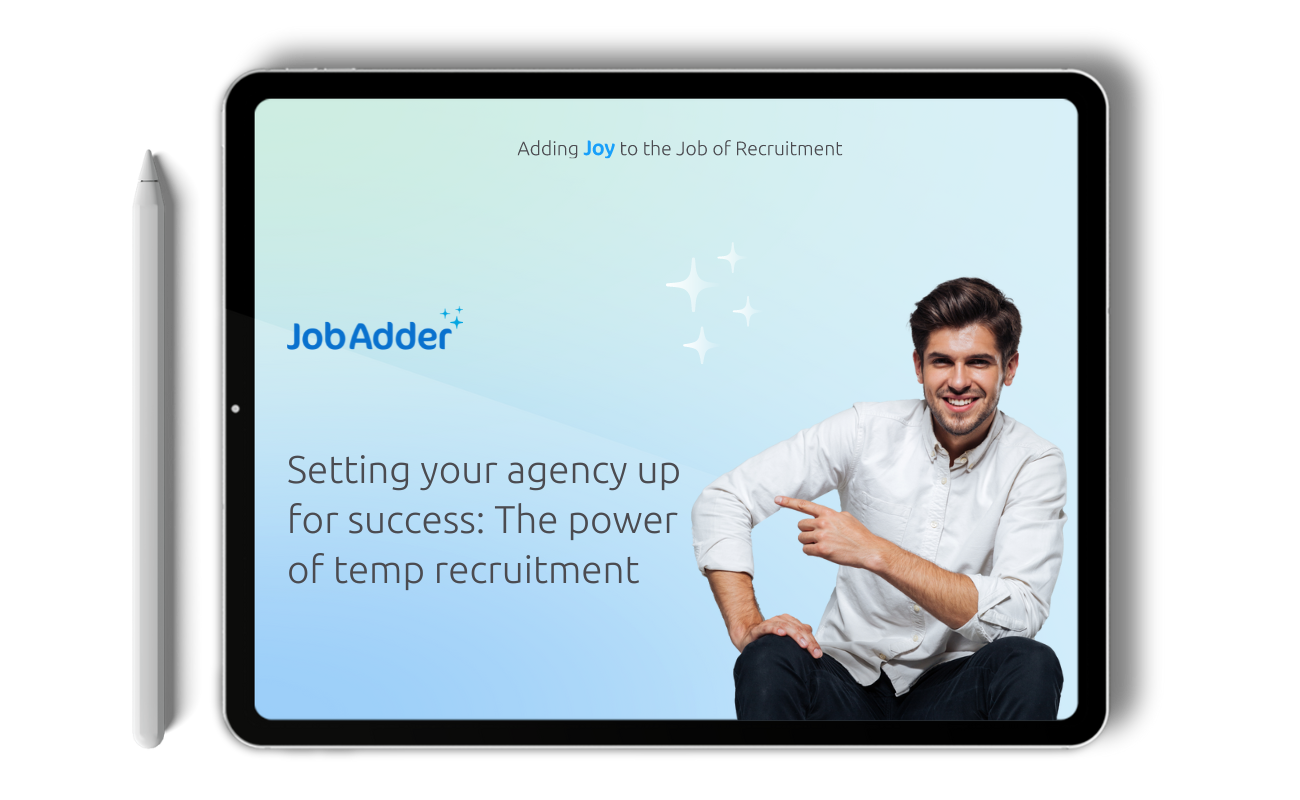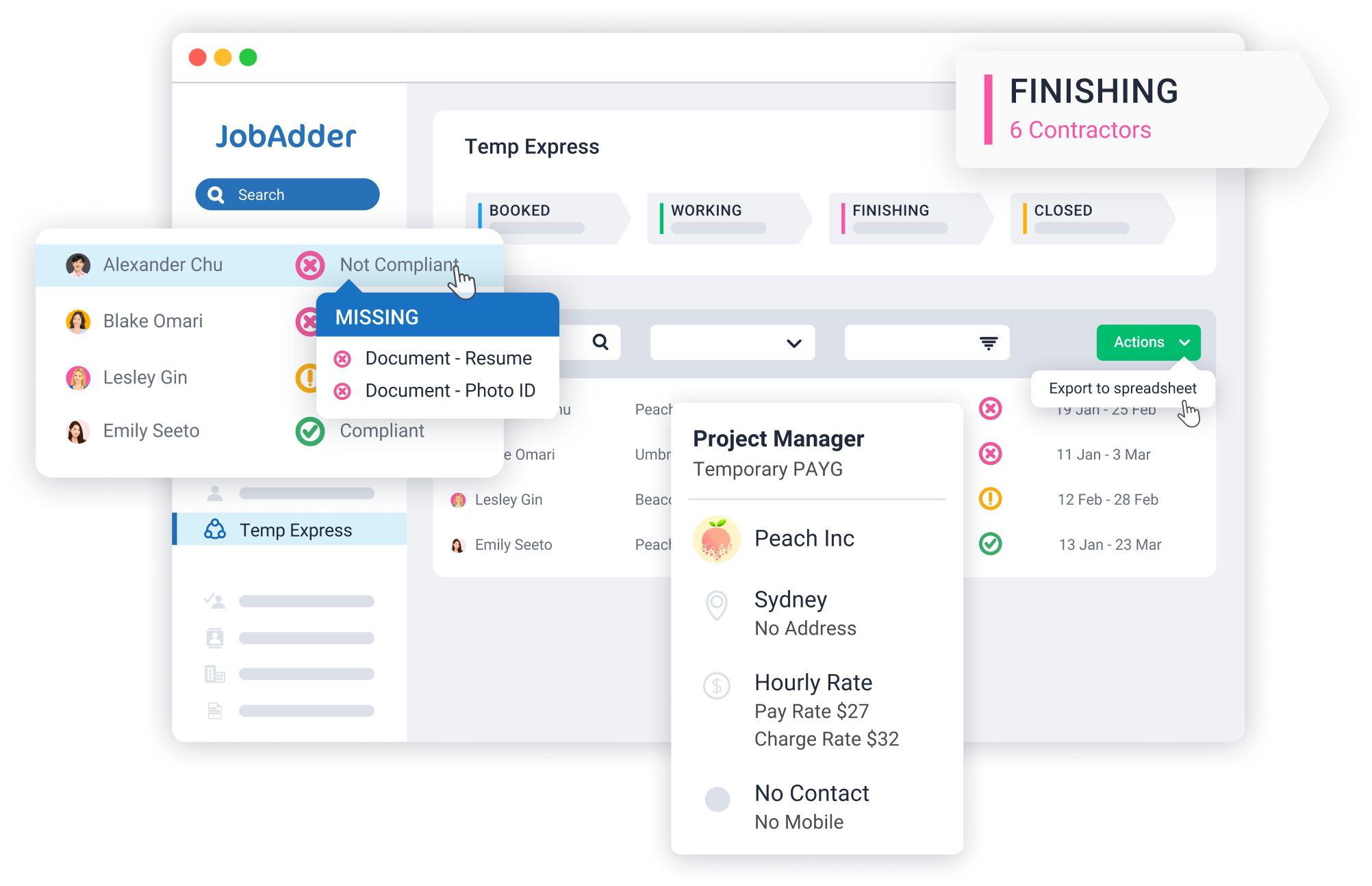Recruitment Blog
The challenges of balancing permanent and temporary recruitment

Balancing permanent and temporary recruitment can be challenging for dual desk recruitment agencies for a number of reasons.
These challenges could range from balancing competing demands and effective time management to managing candidate expectations and client relationships and handling cash flow complexities and resource allocation.
Below we’ll dive into these issues and provide some helpful tips for dual desk recruiters.
FREE WEBINAR: How to build a resilient temp business in 2023
Time management
Permanent recruitment typically involves longer hiring cycles and more comprehensive assessments of candidates, whereas temporary recruitment requires a faster turnaround and a focus on finding suitable candidates quickly.
Effective time management is essential for dual desk recruiters to ensure they can balance the demands of permanent and temporary recruitment. Below are a few handy strategies that can help.
Prioritise tasks
Make a list of all the tasks you need to complete for both permanent and temporary recruitment and prioritise them based on urgency and importance. Focus on high-priority tasks first to ensure that they’re completed on time.
Set realistic goals
Set realistic goals for what you want to achieve each day or week, and break down larger tasks into smaller, manageable steps. This will help you to stay on track and avoid feeling overwhelmed.
Create a schedule
Create a schedule that includes specific times for making calls, sending emails, scheduling interviews and other tasks. This will help you to stay focused and avoid distractions.
Use technology
Take advantage of technology tools such as Applicant Tracking Systems (ATS) and automation tools to streamline your workflows and save time. If you want more info on the benefits of an ATS, our free eBook breaks it all down.
Discover how temp recruitment could set your recruitment agency up for success.

Delegate tasks
If you have a team of recruiters, delegate tasks to other team members where possible. This can help to reduce your workload and ensure that tasks are completed on time.
Take breaks
Take regular breaks throughout the day to help you stay focused and avoid burnout. Even short breaks can help to improve your productivity and overall well-being.
Learn to say no
If you’re feeling overwhelmed or don’t have the capacity to take on additional tasks, learn to say no. This will help you to manage your workload effectively and avoid taking on too much at once.
By prioritising tasks, setting realistic goals, creating a schedule, using technology, delegating tasks, taking breaks and learning to say no, dual desk recruiters can manage their time effectively and provide high-quality services to their clients.
Candidate expectations
Candidates for permanent and temporary roles typically have different expectations due to the nature of the positions they are applying for. Here are some common expectations for each type of role:
Permanent roles:
- Long-term career growth opportunities
- Higher salaries and benefits
- Job security
- Opportunities for skill development and training
- A company culture that values employee satisfaction
- Opportunities for advancement within the company
Temporary roles:
- Short-term work or contract roles
- Flexibility in work schedule
- Higher hourly rates
- Opportunities to gain experience in various industries or roles
- Potential for immediate employment without a long hiring process
- Ability to work with a variety of employers and industries
But keep in mind that these expectations are not exclusive to each type of role, and there may be some overlap.
Dual desk recruiters need to understand and manage these differing expectations effectively to ensure that they can attract the right candidates for each type of role.
Client relationships
Dual desk recruiters who are managing clients that need both permanent and temporary staff can use the following strategies to better manage these relationships.
Prioritise based on urgency
When clients have both permanent and temporary recruitment needs, it’s important to prioritise based on urgency. If a client needs a temporary worker immediately, focus on fulfilling that need first before moving on to permanent recruitment.
Build a strong pipeline of candidates
To manage clients that need both permanent and temporary staff, dual desk recruiters should build a strong pipeline of candidates for both types of roles. This will allow them to respond quickly to their clients’ needs and provide a faster turnaround time. Our recruitment global reports consistently find that those who source from their database fill roles faster than those who source through job ads. Having a diverse and deep talent pool and pipeline means you can move quickly, no matter what the role is.
Communicate regularly
We all know that communication is key. If you’re managing clients with both permanent and temporary staff needs, ensure you’re doing regular check ins to provide updates on your progress, address any concerns or questions and set clear expectations for timelines and outcomes.
Offer flexible recruitment solutions
Dual desk recruiters can offer flexible recruitment solutions that meet the changing needs of their clients. For example, they could offer temp-to-perm solutions that allow clients to assess a temporary worker’s fit before offering them a permanent position.
Be proactive
Dual desk recruiters should be proactive in managing their clients’ recruitment needs. This means anticipating their clients’ staffing requirements, suggesting suitable candidates and providing guidance on recruitment strategies.
Overall, managing clients that need both permanent and temporary staff requires careful planning, strong communication and flexibility. By doing all of the above, dual desk recruiters can better manage these relationships and become trusted recruitment partners for their clients.
Managing cash flow
Permanent recruitment fees are typically higher than temporary recruitment fees, which can impact a recruitment agency’s cash flow. Dual desk recruitment agency owners need to manage their cash flow effectively to ensure that they can continue to operate and provide both perm and temp services. Here’s a few things that agency owners can consider.
Forecast cash flow
Dual desk recruitment agency owners should create a cash flow forecast that tracks expected inflows and outflows over a given period. This can help them anticipate potential cash flow gaps and plan accordingly.
Negotiate payment terms
Agency owners can negotiate payment terms with their clients and suppliers to improve cash flow. Another common trend we see in our recruitment industry reports is a steady increase in agency fees, reflecting the complexity of the current market.
Invoice promptly
Dual desk recruitment agency owners should ensure they invoice clients promptly and follow up on overdue payments. Implementing a regular billing cycle can help ensure a steady stream of cash flow.
This just scratches the surface and some dual desk recruitment agencies may already do these things, implementing savvy strategies to balance the books and the differences between perm and temp recruitment.
Resource allocation
Balancing the resources required for both types of recruitment can be challenging for mid-sized or dual-desk recruitment agencies. For example, dual desk agencies may need to allocate more resources to temporary recruitment during peak times, but also need to ensure they have enough resources for permanent recruitment when needed. For those agencies that struggle with this, here are a few ideas for how you can better manage resources and staff.
Create clear roles and responsibilities
Recruitment agencies should establish clear roles and responsibilities for their staff. This includes defining the roles of permanent recruiters, temporary recruiters, administrative staff and support staff.
Analyse workload
Dual desk recruitment agencies should analyse their workload and identify areas that require the most resources. This includes analysing the types of roles they are recruiting for, the volume of candidates they are handling and the level of client demand.
Determine resource needs
Based on the workload analysis, dual desk recruitment agencies should determine their resource needs. This includes assessing the number of recruiters, admin staff and support staff required to meet the workload demands.
Allocate resources effectively
Once the resource needs have been determined, dual desk recruitment agencies should allocate resources effectively. This includes assigning recruiters to specific clients or industries, streamlining administrative tasks and ensuring support staff are available to assist with day-to-day operations.
Provide training and development
Recruitment agencies should invest in training and development programs for their staff. This includes providing ongoing training on recruitment best practices, industry trends and new technologies.
Monitor performance
Recruitment agencies should regularly monitor their staff’s performance and provide feedback and coaching where necessary. This includes tracking key performance indicators, such as time-to-hire and candidate quality, to identify areas for improvement.
Leverage technology
Recruitment agencies can leverage technology, like an ATS and CRM (wink wink, nudge nudge) to help manage their resources and staff more effectively. By utilising an ATS and CRM, agencies can automate or even remove administrative tasks and free up recruiters’ time to focus on more high-value activities.
Continuously improve processes
Recruitment agencies should continuously evaluate and optimise their recruitment processes to improve their efficiency and effectiveness. This includes assessing the effectiveness of their resource allocation, the efficiency of their recruitment processes and the impact of their training and development programs.
Overall, balancing permanent and temporary recruitment requires careful planning and management to ensure both types of recruitment are successful and meet the needs of both clients and candidates.
Want to find out more about how to develop a strong dual-desk agency? Check out our webinar: How to build a resilient temp business in 2023.
Ready to grow profits and resilience with a strong temp desk? Get expert insights now.

Related blog posts

To excel in the competition for top talent, proactive workforce planning is essential. Traditional methods struggle to adapt to evolving …
Ready to get started?
Talk to one of our friendly team members



